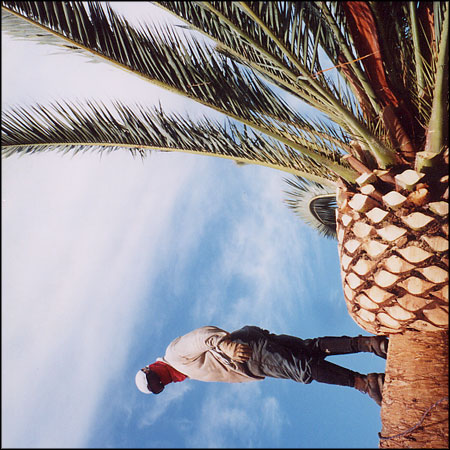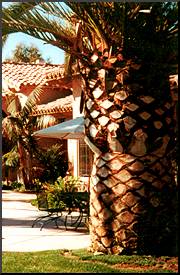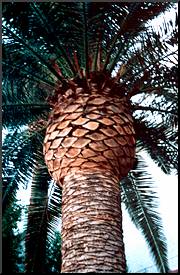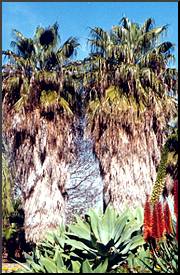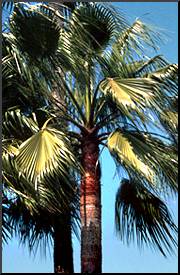Golden Gate Palms offers several different scheduled maintenance packages for our customers which range from monthly visits to yearly visits for trimming and proper fertilization. Through our maintenance program your palms will get the correct amount and type of nutrition at the correct time of year as well as the proper trim job. Our goal is to make your palms the envy of the neighborhood. Call or email us for a quote to maintain your personal paradise.
I. Planting
When planting a containerized palm, dig a hole as deep and slightly larger in width than the pot size being planted. Mix equal amounts of a high quality compost with the native soil for backfill. Several handfuls of slow release Palm Pro fertilizer can be mixed into this backfill to promote lush growth and dark green color. Palms that have been freshly cut from the field (bareroot) need to be treated differently. Since these palms have fresh cut roots, they need to be completely encased by 4-6" of salt free sand to prevent the roots from rotting. The sand and the hole must be free draining. Built up water in the planting hole can become foul and cause rotting of the rootzone, and if left unchecked, eventually death of the plant. The root zones of these field dug or "bareroot" palms must remain constantly moist but not saturated to promote future root and top growth.
II. Watering
Although very drought tolerant when established, palms love water. Most palms come from very moist growing situations such as can be found in rainforests, along streams and rivers, or subterranean water sources such as an underground stream. And therefore, to look their best, keep palms constantly moist- before, during, and after planting. We suggest deep watering by pulsing spray heads at set intervals to allow seepage to the bottom most roots or running a slow application rate drip system to achieve the same effect. Sago Palms (and most Cycads for that matter), differ in their watering requirements from palms in that they would prefer to go dry between waterings since a constantly damp situation can cause rot.
III. Fertilization
Palms appreciate moderate to heavy amounts of fertilization to keep their best color and to promote rapid growth. Spring, Summer, and Fall is the growing season for most palms in the San Francisco Bay Area, and this is when fertilizer will be most useful to the palm. We suggest a slow release fertilizer such as our Palm Pro granular which comes in a fifty pound bag, or our Kelp special which comes in smaller bags. Amounts to apply would be a cup full every 3-4 months for a 15 gal. plant, two cups for 24" box, 3 cups for 36" box and 4 cups for large 48" boxed or field grown palms. Also a quick acting foliar feed such as Miracle Grow or Peter's brand can be applied in the early Spring to jump start the palms after the cool Winter hiatus.
IV. Trimming Techniques/Options
For the most part, palms should be trimmed at least yearly if not more often (resorts trim monthly to keep a perfect look to the trees). Most palms look best if trimmed to the horizontal point, or 90 degree point. Never should the palms be trimmed back past the 45 degree point. Always trim the palms back to the point of termination on the trunk below the last spines (if any). Clustering palms such as Phoenix reclinata or Chaemerops humilis can be trimmed to a solitary structure- cutting off all the suckers at the base- or more artistically a clumping structure whereby one would select the best 5 or seven trunks and encourage them while cutting off all the remaining suckers. Many patient years of this clumping structure trimming technique can yield amazing multitrunked trees of very high value (People have paid up to $150,000 for century old Phoenix reclinata specimens purchased right out of private gardens). Golden Gate Palms offers complete palm trimming services. Please inquire for a quote.

